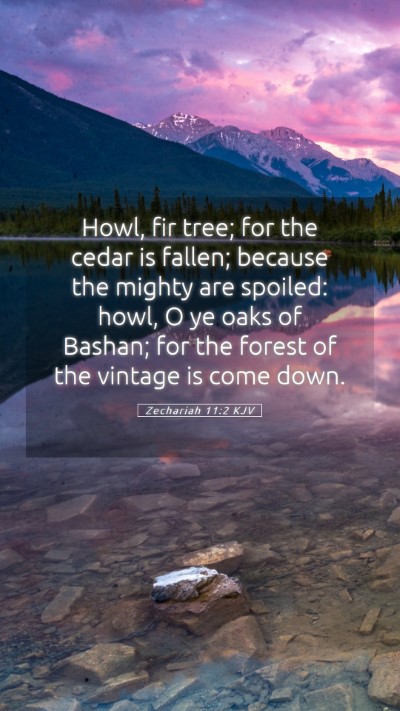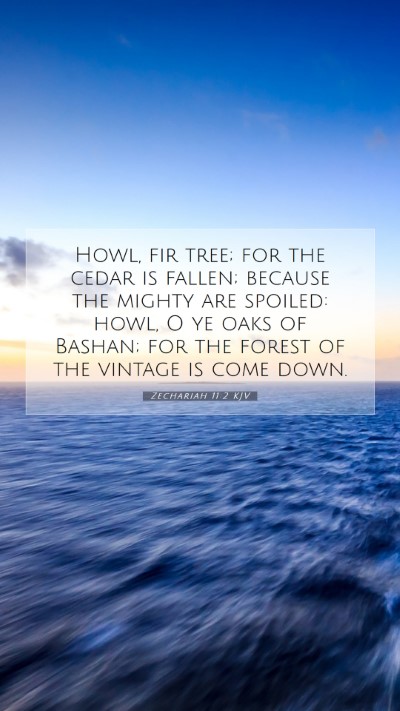Old Testament
Genesis Exodus Leviticus Numbers Deuteronomy Joshua Judges Ruth 1 Samuel 2 Samuel 1 Kings 2 Kings 1 Chronicles 2 Chronicles Ezra Nehemiah Esther Job Psalms Proverbs Ecclesiastes Song of Solomon Isaiah Jeremiah Lamentations Ezekiel Daniel Hosea Joel Amos Obadiah Jonah Micah Nahum Habakkuk Zephaniah Haggai Zechariah MalachiZechariah 11:2 Meaning
What is the meaning of Zechariah 11:2?
Howl, fir tree; for the cedar is fallen; because the mighty are spoiled: howl, O ye oaks of Bashan; for the forest of the vintage is come down.
Zechariah 11:2 Bible Verse Meaning
Understanding Zechariah 11:2
Zechariah 11:2 states, "Howl, O cypress; for the cedar is fallen; because the mighty are spoiled: howl, O ye oaks of Bashan; for the forest of the vintage is come down."
This verse uses symbolic language to depict a dire situation. It calls upon the cypress and the mighty oaks of Bashan to mourn over the fallen cedar, signifying a loss of strength and prominence. This scripture provides rich insights that can be explored using public domain commentaries from notable authors such as Matthew Henry, Albert Barnes, and Adam Clarke.
Commentary Insights
-
Matthew Henry:
Henry emphasizes the lamentation aspect of the verse, indicating the sorrow that should encompass those who witness the fall of powerful leaders or nations. The cypress and oak trees symbolize strength and grandeur, and their mourning signifies the gravity of the situation affecting the people. He interprets this as an allusion to divine judgment upon leaders who have failed to uphold righteousness.
-
Albert Barnes:
Barnes highlights the implication of the cypress and oaks as the mighty and distinguished individuals of society. He points out that their mourning indicates a significant shift in power dynamics, as the fall of the cedar signifies a considerable loss. Barnes elaborates on the idea that God’s judgment may lead to upheavals within nations and communities, prompting reflection on the state of leadership and morality.
-
Adam Clarke:
Clarke delves into the historical context behind the verse, explaining that the trees represent the leaders of Israel and their ultimate fall due to disobedience. He provides an interpretation that connects this lament to the fall of the Jewish leadership before the Babylonian Exile, encouraging readers to understand the significance of national strength in accordance with God's will.
Meaning and Significance
The rich symbolism in Zechariah 11:2 prompts a deeper examination of its implications for understanding biblical repentance and the nature of leadership under God's oversight. From the mourning of the mighty trees, we gain insights into the impact of divine judgment and the responsibility of leaders to uphold divine statutes.
Contextual Analysis
Understanding this verse requires us to look at its historical background, recognizing that the context of Zechariah’s prophecies largely pertains to the restoration of Israel after exile. This was a tumultuous time, highlighting themes of loss, judgment, and eventual restoration.
Application to Daily Life
For modern readers, the lessons drawn from Zechariah 11:2 can contribute to personal introspection and moral fortitude. These insights encourage individuals to consider their responsibilities within their communities and the impact of leadership and authority in contemporary settings.
Related Bible Cross References
- Isaiah 10:33-34: Discusses the judgment and the subsequent downfall of proud leaders.
- Ezekiel 31:3-9: Compares the greatness of nations to mighty trees, underscoring their vulnerability.
- Psalm 37:35-36: Reflects on the transient nature of the wicked and their eventual demise.
The insights gained from these reflections serve as critical bible study insights and enhance the bible verse understanding, driving towards a more profound comprehension of Scripture.
Final Thoughts
Through examining Zechariah 11:2 in light of historical context, biblical exegesis, and scriptural analysis, readers are better equipped to interpret the meanings behind challenging Bible verses as they relate to leadership, morality, and the reverberations of divine judgment in our lives.


